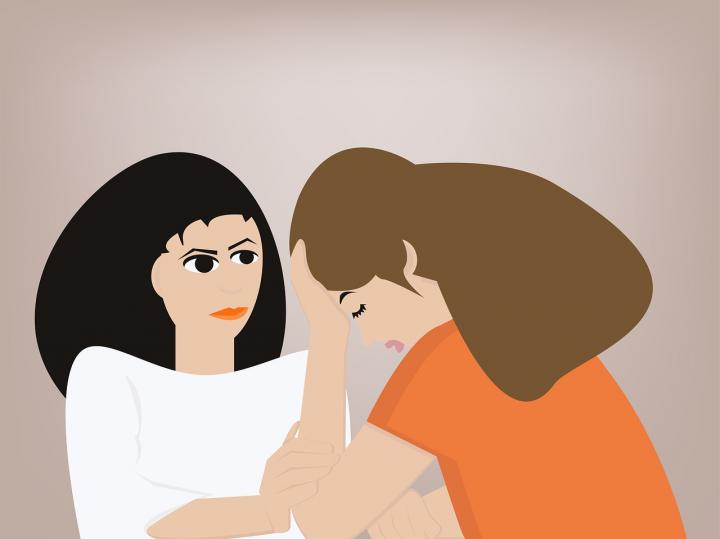
There is no doubt in my mind that my job as an emergency and critical care specialist is much easier when I work at a hospital with a mental health professional on staff. As an advocate for wellness in the veterinary profession, I am passionate about reducing the struggles that veterinary care providers face at work, which contribute to their psychological distress and poor mental health. And one of the things that has become clear to me during my career is that we are not equipped to deal with most of the mental health crises that arise on the job. Let me give an example…
When I was in my third year of my residency program, a paraplegic owner came in with his dog who was in status epilepticus (continuous seizure activity) and unconscious. When we were finally able to stop the seizures, it became apparent that the dog was not able to breathe well on her own. Eventually, we learned that she had ingested some of her owner’s muscle relaxant medication, which helped to reduce the spasms that he experienced consequent to his spinal cord injury. I let the owner know that we would try to save his dog, but that she would require mechanical ventilation and intensive care to do so. He consented to care and then promptly said “if my dog dies, I will kill myself, she is my only reason for living”. He then proceeded to tell me that he had become a paraplegic only months before due to a motorcycle accident and acquired his dog soon after. He said that she had saved his life and that if we couldn’t save hers he would end his.
This statement was jarring for me and I immediately panicked. What was I supposed to say? I could not guarantee his dog’s survival and clearly there was a lot at stake here. I calmly told him that we would do the best that we could and asked if there was anyone I could call to be there for him. His family members arrived and tried to console him, but it was clear that his attachment to his dog and the psychological distress that he was experiencing were far beyond my ability to handle as a small animal emergency and critical care resident. This was a situation when a mental health provider – counselor, social worker, psychologist, or other – would have been ideal.
Now I am glad to say that the story ended happily and the dog recovered and was discharged to her owner. But I am sad to say that these situations are not unique in veterinary practice. We constantly speak with clients who have strong attachments to their pets and claim that they will not be able to “go on” without them. In fact, I have had several owners tell me that during my time in practice. The difference in some of these other situations is that in a select few hospitals I have been lucky enough to have a mental health professional on site (or on call) to speak to these clients.
Mental health professionals in veterinary practice are becoming more common but remain exceptionally rare. As a locum, I work in many different specialty and academic hospitals in Canada and the USA and estimate that less than one-third have access to an on-call or part-time mental health professional. Far fewer have a full-time mental health professional on staff. This is surprising given the mental health struggles that veterinary care providers themselves face, not to mention the difficult situations that can arise with pet owners. Likewise, veterinary students have rates of stress and depression that exceed that of other professional students, yet few veterinary schools in Canada and the USA have a counselor on-site. This is in stark contrast to human medical teaching hospitals, which cannot become accredited unless they have a dedicated mental health professional.
So, what is being done to mitigate this? I am happy to say that the University of Tennessee has a veterinary social work program dedicated to training social workers regarding the specific struggles that veterinary care providers and pet owners face. Part of the veterinary social work oath states: “Specializing in veterinary social work, I pledge my service to society by tending to the human needs that arise in the relationship between humans and animals.” Four modules are included in the training: compassion fatigue and conflict management, the link between human and animal violence, animal-assisted interventions, and animal-related grief and bereavement.
Most of the practices I work at that have a mental health professional utilize donations or hospital-generated revenue to cover the costs. And the investment is sure to pay off if it means that veterinary professionals can focus on caring for the animals, rather than the owners. Likewise, the benefits are clear for the staff in terms of having someone to speak to regarding their own mental health struggles, so that they can sustain longevity in the profession.
For more information regarding the University of Tennessee Veterinary Social Work Program, please visit: http://vetsocialwork.utk.edu/.
Marie K. Holowaychuk, DVM, DACVECC is a small animal emergency and critical care specialist and certified yoga and meditation teacher who has an invested interest in the health and well-being of veterinary professionals. She facilitates wellness workshops, boot camps, and retreats for veterinarians, technicians, students, and other veterinary care providers. To sign up for newsletters containing information regarding these events and veterinary wellness topics, please click here. More information can be found at www.criticalcarevet.ca.